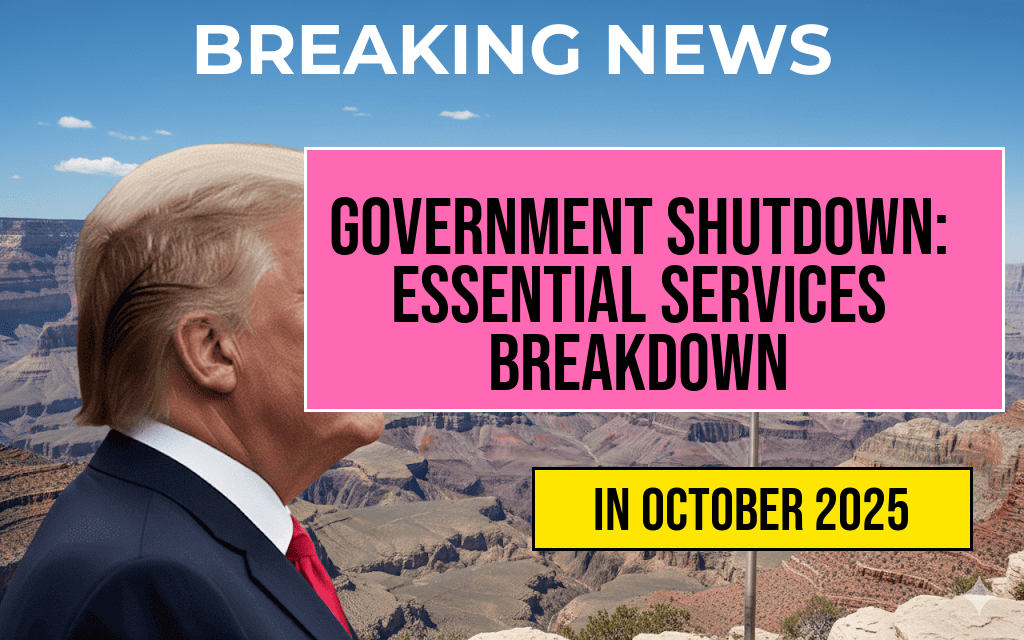A potential government shutdown can have significant implications for federal services, affecting millions of Americans and various sectors across the nation. As negotiations stall in Congress, the possibility of a shutdown grows, prompting concerns over the continuity of essential government functions. This article provides an agency-by-agency breakdown of how a shutdown may impact critical services, including Social Security, the IRS, defense operations, and TSA security measures. Understanding these effects can help citizens prepare for the potential disruption in services they rely on daily.
Impact on Social Security
Despite the looming threat of a government shutdown, Social Security payments are expected to continue. The Social Security Administration operates largely on trust funds, enabling it to maintain its disbursement of benefits to retirees, disabled individuals, and survivors. However, new applications and services may face delays, as many staff members could be furloughed.
IRS Operations
The Internal Revenue Service (IRS) is another agency that experiences notable disruptions during a government shutdown. While taxpayers can still file their returns and make payments, processing of refunds may be delayed. The IRS typically operates with a skeleton crew during shutdowns, focusing only on essential functions, which can lead to longer wait times for assistance and slower responses to taxpayer inquiries.
Defense and Military Readiness
The Department of Defense (DoD) faces unique challenges during a shutdown. While active-duty military personnel remain on duty, many civilian employees may be furloughed, impacting bases and support functions. Training exercises and other non-essential operations could be canceled or postponed, affecting readiness. Contracts for defense projects may also face delays, which can have long-term implications for national security.
Transportation Security Administration (TSA) and Air Travel
For those traveling by air, the Transportation Security Administration (TSA) plays a crucial role in ensuring safety at airports. During a shutdown, TSA agents are considered essential personnel and will continue to work, but they may not receive their paychecks on time. This situation could lead to lower morale and increased wait times at security checkpoints, as fewer staff may be available if overtime is restricted.
Food and Drug Administration (FDA) and Public Health
The Food and Drug Administration (FDA) oversees the safety of food and medical products. In a shutdown scenario, routine inspections might be curtailed, posing risks to public health. The agency would prioritize critical inspections but would likely delay routine reviews and approvals for new drugs and food products, impacting healthcare and consumer safety.
Federal Housing Administration (FHA) and Housing Assistance
The Federal Housing Administration (FHA) plays a vital role in the housing market, providing mortgage insurance and supporting homebuyer programs. During a shutdown, the FHA may halt loan processing, affecting home purchases and refinancing. Buyers relying on FHA loans could face significant delays, complicating the housing market dynamics.
Essential Services and Emergency Operations
While many government services may be disrupted, certain essential operations remain functional. Emergency services, including law enforcement, fire departments, and emergency medical teams, will continue to operate. Additionally, federal law enforcement agencies, such as the FBI and DEA, will maintain their operations to ensure public safety and national security.
State and Local Governments’ Response
State and local governments often have contingency plans to address the impacts of a federal shutdown. Many local agencies rely on federal funding, and a prolonged shutdown could strain their resources. However, states may step in to fill gaps, particularly in areas like health services and law enforcement, to ensure continuity of care and safety for residents.
Conclusion
The potential for a government shutdown presents a complex landscape for numerous federal agencies and the citizens they serve. While essential services such as Social Security and TSA operations may remain intact, delays and disruptions in other areas could have significant consequences. As negotiations continue in Congress, the implications of a shutdown are becoming increasingly clear, prompting citizens to remain informed and prepared.
- Forbes: Government Shutdown Impact
- Wikipedia: Government Shutdown
- NPR: What to Know About the Government Shutdown
Frequently Asked Questions
What happens to Social Security payments during a government shutdown?
During a government shutdown, Social Security payments continue as they are considered essential services. Beneficiaries can expect their payments to be processed on schedule without interruption.
Will the IRS still process tax returns during a government shutdown?
During a government shutdown, the IRS may reduce its operations, leading to delays in tax return processing and refunds. However, some essential functions may continue to operate to support taxpayers.
How does a government shutdown affect defense services?
Defense services are largely maintained during a government shutdown, with military personnel continuing to work. However, certain non-essential functions and programs may be paused or scaled back.
What should travelers know about TSA operations during a government shutdown?
The TSA continues to operate during a government shutdown, ensuring that airport security remains in place. However, staffing levels may be affected, potentially leading to longer wait times at security checkpoints.
Are there any impacts on federal employees during a government shutdown?
Many federal employees may face furloughs during a government shutdown, meaning they will not work or receive pay until the shutdown ends. Essential personnel, however, are expected to continue their duties.

Leave a Reply